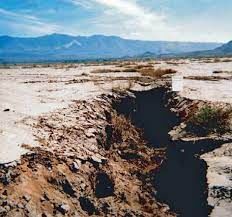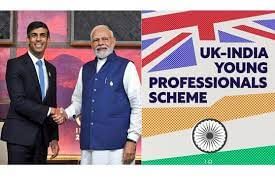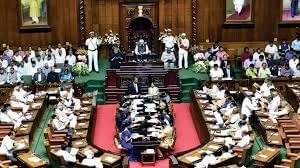UPSC Daily Current Affairs-10th January 2023 | Current Affairs & Hindu Analysis: Daily, Weekly & Monthly PDF Download
GS-I
Land subsidence
Context
The exact reason behind Joshimath land subsidence is still unknown but experts cite unplanned construction, over-population, obstruction of the natural flow of water, and hydel power activities as possible causes.
About Land Subsidence:
- According to the National Oceanic and Atmospheric Administration (NOAA), subsidence is the sinking of the ground because of underground material movement.
- Reasons can be manmade or natural:
- removal of water, oil, or natural resources, along with mining activities
- Earthquakes
- Soil erosion and
- Soil compaction
Reasons behind Joshimath subsidence:
- unplanned construction,
- over-population,
- obstruction of the natural flow of water and hydel power activities.
- the area is a seismic zone, which makes it prone to frequent earthquakes.
- the subsidence in Joshimath might have been triggered by the reactivation of a geographic fault —
- defined as a fracture or zone of fractures between two blocks of rock — where the Indian Plate has pushed under the Eurasian Plate along the Himalayas.
Source: Indian Express
GS-II
Project Sambandh
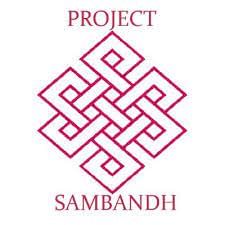
Context
Project Sambandh helping families of Army personnel who die in non-battle scenarios.
About Project Sambandh
- It is an initiative of Retired army officer and Shaurya Chakra awardee Colonel Vembu Shankar.
- It is a one-man philanthropic initiative to connect the Next of Kin (NoK) of ‘physical casualties’ in the Army - was made in 2017.
- It was initially started as a 1,000-day endeavour to reach out to families of army officers who lost their lives under ‘non-operational circumstances’ such as physical ailments, accidents, and suicides.
- Features: Project Sambandh has identified that the NoKs, particularly young widows and children of the army personnel, face three kinds of challenges - financial, emotional, and social.
- Objectives: The main intent of the project was to bring awareness about the challenges the NoK of the physical casualties faced and assist them in connecting them to the Directorate of Indian Army Veterans, which provided several educational and social schemes to children and the widows of slain army personnel, he said.
Source: TH
What is Young Professionals Scheme?
Context
Recently, India and the United Kingdom signed and exchanged letters for Young Professionals Scheme in London.
About Young Professionals Scheme:
- It was conceived as part of an India-U.K. Migration and Mobility MoU signed in May 2021 and was announced in November at the G20 summit in Bali.
- It will permit up to 3,000 of their degree-holding citizens aged between 18 and 30 to live and work in each other’s countries for two years.
- The programme will be reciprocal, also allowing UK professionals in the same position to participate in a professional exchange by living and working in India.
- This scheme makes India the first visa-national country to benefit from the scheme.
Source: Indian Express
Governor’s Address to the State Legislature
Context
Governor of Tamil Nadu, R N Ravi, skipped certain portions of the text of his customary address to the state’s legislature.
- As a result, the Chief Minister of the state, M K Stalin, moved a resolution demanding only the original printed speech in Tamil be put in records.
- Governor R N Ravi reacted to this in an unprecedented manner by staging a walkout from the House in protest even before the national anthem was played.
- The Constitution gives the President (Article 87) and the Governor (Article 176) the power to address a sitting of the legislature.
- The special power is with regard to two occasions.
- The first is to address the opening session of a new legislature after a general election.
- The second is to address the first sitting of the legislature each year.
- Commonly referred to as the President’s or Governor’s Address, they are a constitutional requirement.
- A session of a new or a continuing legislature cannot begin without fulfilling this requirement.
- Article 176 of the Constitution –
- At the commencement of the first session after each general election to the Legislative Assembly and at the commencement of the first session of each year, the Governor shall address the Legislative Assembly and inform the Legislature of the causes of its summons.
- In the case of a State having a Legislative Council, both Houses assembled together.
- Provision shall be made by the rules regulating the procedure of the House or either House for the allotment of time for discussion of the matters referred to in such address.
- At the commencement of the first session after each general election to the Legislative Assembly and at the commencement of the first session of each year, the Governor shall address the Legislative Assembly and inform the Legislature of the causes of its summons.
- Similar provisions exist in other democracies.
- In the United States, it is referred to as the “State of the Union”.
- In the United Kingdom, it is referred to as the Queen’s Speech and is part of the ceremony to mark the formal start of the parliamentary year.
- The President’s Address in India is mirrored on the British system.
- During the framing of the Constitution, Dr B R Ambedkar drew a similarity between the President and the monarch under the English system.
- He said –
- the President “is the Head of State but not of the executive. He represents the nation but does not rule the nation. He is the symbol of the nation. His place in the administration is that of a ceremonial device of a seal by which the nation’s decisions are made known”
- The President’s/Governor’s speech follows the convention of the British system, where it contains legislative and policy proposals that the government intends to initiate.
- The speech also recaps the government’s accomplishment in the previous years.
- The contents of the speech are put together by aggregating inputs from various ministries of the government.
- The Constitution, under Article 74 and Article 163 respectively, binds the President and the Governor to act on the aid and advice of the Council of Ministers of the Union and state governments respectively, on a majority of issues.
- Therefore, the speech that the President or the Governor reads before the legislature is the viewpoint of the government and is prepared by it.
- The President or a Governor cannot refuse to perform the constitutional duty of delivering an address to the legislature.
- But there can be situations when they deviate from the text of the speech prepared by the government.
- So far, there have been no instances of President doing so. But there have been multiple occasions when a Governor skipped a portion of the address to the Assembly.
- The debate has not been conclusively decided.
- In Shamsher Singh v. State of Punjab, the Supreme Court said that the principle that the President (or the Governor) is guided by the aid and advice of the Cabinet covered every function.
- Whether it relates to addressing the House or returning a Bill for reconsideration, or assenting or withholding assent.
- Many experts believe that it was the intention of the Constitution-makers that the Governor’s speech would be prepared by the Council of Ministers and the Governor would read it.
- Hence, they are of the opinion that if a Governor violates this convention and deletes any para of the address under the cloak of his discretionary power, his action may not be unlawful’ from a rigid legalistic viewpoint.
- However, this will surely strike at the roots of the norms of parliamentary system of government.
- In Shamsher Singh v. State of Punjab, the Supreme Court said that the principle that the President (or the Governor) is guided by the aid and advice of the Cabinet covered every function.
Source: Indian Express
GS-III
Living Root bridges of Meghalaya
Context
A farmer takes forward the State’s traditional practice of building root bridges and connects two areas across Umkar river in Cherrapunji.
About Root bridges:
- Locally known as ‘ jingkieng jri ’ the living Root bridges are one of Meghalaya’s most beautiful tangible heritage sites.
- These sites have recently been added to the tentative UNESCO world heritage site list.
- Some of the most popular of these living root bridges are in Nongriat, Cherrapunji, Nongbareh and other nearby locations.
- These are naturally built bridges mainly built by firstly planting two rubber trees of the Ficus elastica on either side of a river.
- It is a type of simple suspension bridge formed by the method of tree shaping to form living plant roots across a stream or river.
- These are very common in the southern part of Meghalaya grown by the Khasi and Jaintia tribes
- These bridges can also be found in the state of Nagaland.
- The earliest written record of Cherrapunji’s bridges can be found in the 1844 Journal of the Asiatic Society of Bengal.
Source: The Hindu
Veer Guardian 2023
Context
Furthering air defence cooperation, Veer Guardian 2023 will be held between the Indian Air Force (IAF) and Japan Air Self Defence Force (JASDF) as the first bilateral air exercise at Hyakuri Air Base in Japan
Exercise Veer Guardian:
- It is a maiden joint air exercise between India and Japan
- It will also be the first time when an Indian Air Force woman fighter pilot would be part of the Indian contingent for aerial wargames in a foreign land.
- The participating IAF contingent will include four Su-30 MKI, two C-17 & one IL-78 aircraft. On the other hand, the JASDF contingent will consist of four F-2 & four F-15 aircraft
- The first edition of the bilateral air exercise will see the conduct of various aerial combat drills between the Air Forces of India and Japan.
- The joint exercise will also include multi-domain air combat missions in a complex environment allowing the air warriors to exchange their best practices.
- The conduct of exercise Veer Guardian 2023 is a decision taken to step up the defence cooperation between the two nations which was taken during the second 2+2 Foreign and Defence Ministerial meeting held in Tokyo, Japan in 2022.
- Exercise Veer Guardian will be another step in deepening strategic ties and closer defence cooperation between India and Japan, reflecting the growing security cooperation between the two sides. The joint exercise will fortify the long-standing bond of friendship between the two Air Forces.
Source: News on air
African Swine Fever
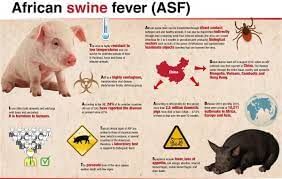
Context
The district administration of Damoh in Madhya Pradesh has killed 700 pigs in the last two days amid fear of African Swine Fever in the area, news agency ANI reported.
- Hundreds of animals including cows, bulls and pigs were found dead in the district’s Banawar area within a week.
- In 2021, the northeaster states of Nagaland, Mizoram and Manipur were swept by the disease.
- In December 2022, cases were confirmed in Kerala, Assam and Manipur.
African Swine Fever:
- It is a highly contagious viral disease that attacks pigs and boars
- It is endemic to sub-Saharan Africa but has spread to many other regions of the world, including Asia and Europe.
- It has a high mortality rate.
- It is not known to affect human beings.
- There is no cure or precaution available for the infection yet.
- It can interfere with various cellular signalling pathways resulting in immunomodulation, thus making the development of an efficacious vaccine very challenging.
- In the acute form pigs develop a high temperature (40.5 degrees C or 105 degrees F), then become dull and go off their food. Other symptoms may include vomiting, diarrhoea (sometimes bloody), laboured breathing and coughing, abortion, still births and weak litters and unwillingness to stand.
Miscellaneous:
- Humans can be infected with avian, swine and other zoonotic influenza viruses, such as avian influenza virus subtypes A(H5N1), A(H7N9), and A(H9N2) and swine influenza virus subtypes A(H1N1), A(H1N2) and A(H3N2).
- Human infections are primarily acquired through direct contact with infected animals or contaminated environments, these viruses have not acquired the ability of sustained transmission among humans.
Source :DTE
|
38 videos|5288 docs|1117 tests
|
FAQs on UPSC Daily Current Affairs-10th January 2023 - Current Affairs & Hindu Analysis: Daily, Weekly & Monthly
| 1. What is the full form of UPSC? |  |
| 2. What are the three stages of the UPSC Civil Services Examination? |  |
| 3. What is the significance of the GS-I, GS-II, and GS-III in the UPSC examination? |  |
| 4. What is the importance of daily current affairs in the UPSC exam preparation? |  |
| 5. How can candidates stay updated with daily current affairs for the UPSC exam? |  |

